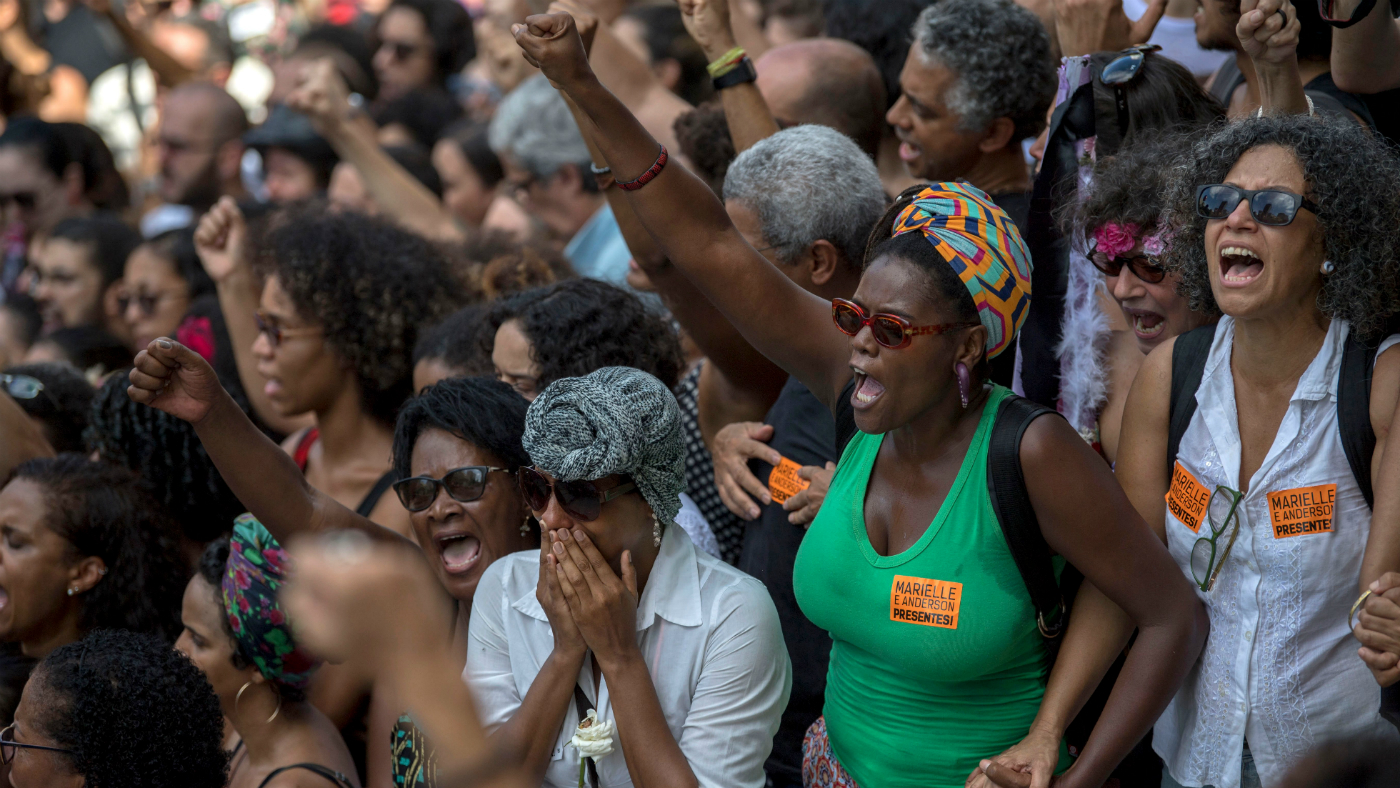Marielle Franco: politician’s murder sparks mass protests in Brazil
The human rights activist and vocal critic of police violence was gunned down in Rio de Janeiro

A free daily email with the biggest news stories of the day – and the best features from TheWeek.com
You are now subscribed
Your newsletter sign-up was successful
Tens of thousands of Brazilians have taken to the streets of Rio de Janiero to protest the murder of Marielle Franco, a city councillor and prominent human rights activist.
The 38-year-old and her driver, Anderson Pedro Gomes, were gunned down in an apparent assassination on Wednesday night after leaving an empowerment event for black women.
Franco’s death has “reverberated across the city and beyond as thousands of people gathered at rallies, expressed their outrage on Twitter and wept openly in public”, the LA Times reports.
The Week
Escape your echo chamber. Get the facts behind the news, plus analysis from multiple perspectives.

Sign up for The Week's Free Newsletters
From our morning news briefing to a weekly Good News Newsletter, get the best of The Week delivered directly to your inbox.
From our morning news briefing to a weekly Good News Newsletter, get the best of The Week delivered directly to your inbox.
As a gay black woman raised in one of Rio’s poorest favelas, Franco “defied the odds” to win the fifth-highest vote count among council members when she was elected in 2016, The Guardian says.
She championed the rights of the most marginalised in Rio, especially poor women of colour and members of the LGBTQ community, and was a vocal critic of police violence.
A Rio public prosecutor who wished to remain anonymous said Franco’s killing appeared to be politically motivated.
“It is far too soon to say, but we are obviously looking at this as a murder in response to her political work, that is a main theory,” the prosecutor told Reuters.
A free daily email with the biggest news stories of the day – and the best features from TheWeek.com
Her murder comes just weeks after President Michel Temer ordered the army to take over security in Rio de Janeiro, following months of worsening gang violence.
Franco, who was part of a commission to oversee the military intervention, “harshly criticised the move” just days before her death, warning that it could worsen police violence against residents, Reuters reports.
-
 Political cartoons for February 14
Political cartoons for February 14Cartoons Saturday's political cartoons include a Valentine's grift, Hillary on the hook, and more
-
 Tourangelle-style pork with prunes recipe
Tourangelle-style pork with prunes recipeThe Week Recommends This traditional, rustic dish is a French classic
-
 The Epstein files: glimpses of a deeply disturbing world
The Epstein files: glimpses of a deeply disturbing worldIn the Spotlight Trove of released documents paint a picture of depravity and privilege in which men hold the cards, and women are powerless or peripheral
-
 Epstein files topple law CEO, roil UK government
Epstein files topple law CEO, roil UK governmentSpeed Read Peter Mandelson, Britain’s former ambassador to the US, is caught up in the scandal
-
 Iran and US prepare to meet after skirmishes
Iran and US prepare to meet after skirmishesSpeed Read The incident comes amid heightened tensions in the Middle East
-
 Israel retrieves final hostage’s body from Gaza
Israel retrieves final hostage’s body from GazaSpeed Read The 24-year-old police officer was killed during the initial Hamas attack
-
 China’s Xi targets top general in growing purge
China’s Xi targets top general in growing purgeSpeed Read Zhang Youxia is being investigated over ‘grave violations’ of the law
-
 Panama and Canada are negotiating over a crucial copper mine
Panama and Canada are negotiating over a crucial copper mineIn the Spotlight Panama is set to make a final decision on the mine this summer
-
 Why Greenland’s natural resources are nearly impossible to mine
Why Greenland’s natural resources are nearly impossible to mineThe Explainer The country’s natural landscape makes the task extremely difficult
-
 Iran cuts internet as protests escalate
Iran cuts internet as protests escalateSpeed Reada Government buildings across the country have been set on fire
-
 US nabs ‘shadow’ tanker claimed by Russia
US nabs ‘shadow’ tanker claimed by RussiaSpeed Read The ship was one of two vessels seized by the US military